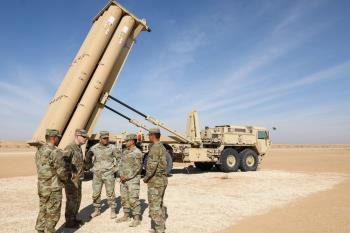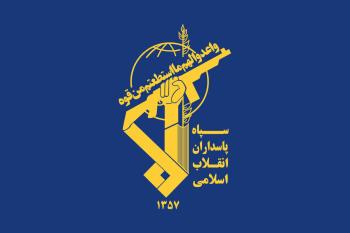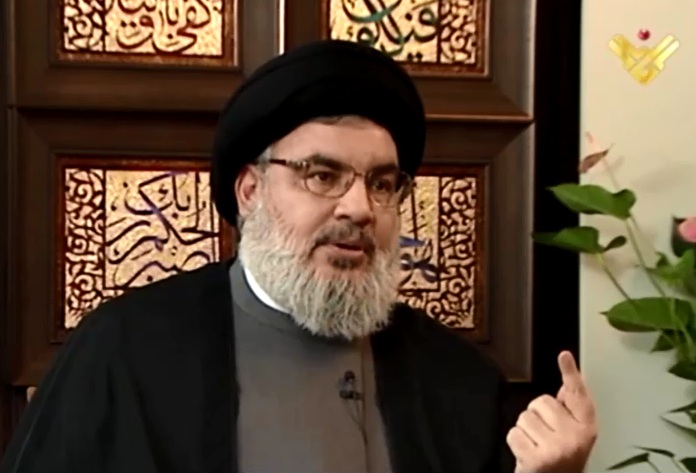Alwaght-Hezbollah leader has warned that the resistance will strike Israeli nuclear facilities, petrochemical factories and biological research institutes if the regime’s army launches a major war against Lebanon.
In an interview with the Arabic language Al-Mayadeen TV on Monday night, Hezbollah Secretary General Sayyed Nasrallah ruled out the possibility of any Israeli war against Lebanon in the near future, noting that the Zionist entity does not engage in any military move without the approval from the United States.
Sayyed Nasrallah reminded that in 2006, the US administration ordered the Israeli government to launch a war against Lebanon.
The Hezbollah leader noted that according to a logical, factual and realistic analysis, there is minimal possibility of any imminent Israeli regime’s war against Lebanon, but that if the Israeli officials decide to launch a military attack, the outcome may differ.
He noted that the Israelis do not launch any war on the basis of demands by some Arab regimes, but added that there are Arab regimes and spies working for the Israelis.
Sayyed Nasrallah pointed out that the Israelis do not start any war if they are not sure of attaining their goals with minimum losses and costs.
The achievements and capabilities of Hezbollah have made the Zionist entity aware that any war it launches against Lebanon would very costly, Sayyed Nasrallah said.
"The Israelis do not abandon the hostages and corpses taken by their enemies; this gives a chance for the Resistance to press the Zionist entity through this factor," he added.
Sayyed Nasrallah underlined that the Israelis know that Hezbollah possesses rockets that can reach all the occupied Palestinian territories, noting that Hezbollah will utilize its military capabilities only in case of an Israeli attack.
“The Israelis have been facing a deadlock since I threatened that Hezbollah would strike Ammonia tanks in Haifa because the Zionist regime failed to move them to any other city due to the public rejection,” he pointed out.
Sayyed Nasrallah added that the Israelis have built petrochemical factories, biological institutes and nuclear reactors in residential areas, since they did not expect that there would be any Arab force that can strike them.
"Either it relied of Arab regimes' guarantees or it positively expected that most of the Arab countries would not strike those targets."
Sayyed Nasrallah said that the all the Israeli measures (Iron Dome, etc.) to deter the Resistance will fail, adding that any Israeli war against Lebanon would very costly because Hezbollah will use very sophisticated weaponry to strike all the Zionist targets without any limit if Israel attacks Lebanon.
To the Israeli officials who are threatening of completely destroying Lebanon, Sayyed Nasrallah asked, "Where would your entity be if Hezbollah strikes all these targets which it possesses all the details about their positions and coordinates?"
The Hezbollah chief addressing the Zionist settlers said, "Ask your government that does not care about you to move the dangerous facilities from the residential areas."
Hezbollah leader asserted that the Resistance movement will never grant the Zionist entity security guarantees, noting that the Resistance aims at preventing the Israelis from attacking Lebanon.
Sayyed Nasrallah responded to the Israeli Prime Minister Benjamin Netanyahu's threat that the Zionist entity will not let Hezbollah obtain game-changing weaponry, by stressing that the Resistance and the Lebanese army has the right to get all the weaponry that can defend Lebanon.
"What is ironic is that Israel possesses nuclear weaponry and some parties criticize the Resistance if it tries to obtain defensive weapons." "Hezbollah follows up all the Israeli preparations for any war despite engagement in the Syrian war."
About the possibility that the Israeli army might launch limited strikes against certain targets in Lebanon without leading a major war, Sayyed Nasrallah warned the Zionists that such small battles will be also costly for them that the Resistance will not accept changing the deterrence formula with the entity and wasting the achievements of the mujahidin and the sacrifices of the martyrs.
Elsewhere in his remarks, Sayyed Nasrallah noted that the Saudi decision to blacklist Hezbollah is actually an Arab cover for any Israeli war against Hezbollah and Lebanon.
"Some Arab leaders asked the Israelis during 2006 war to continue its war against Lebanon and Hezbollah."
"The Arab and Islamic peoples still support the Resistance despite all what has been done to distort Hezbollah’s image," Sayyed Nasrallah added, "They are part of the axis of Resistance (against the Zionist regime) which includes Syria, Iraq, Iran, factions of Palestinian in addition to Hezbollah. In Syria, Russia has joined the axis of resistance though it is not part of it in all the domains."
Sayyed Nasrallah explained the recent Russian military withdrawal from Syria, saying that Russia intensified its military deployment in Syria in preparation for any Russian-Turkish confrontation after Turkey downed a Russian warplane.
He noted that Turkey has never violated the Syrian airspace after Russian threatened to down any warplane that violates Syria sovereignty."So after the tension between Turkey and Russia decreased, the latter withdrew the forces that were summoned upon the escalation," Sayyed Nasrallah pointed out, "The Russian military achievements also allowed Moscow to cut the number of deployed troops." "Russian President Vladimir Putin's threat of deploying troops within hours in Syria if necessary asserts that the Russian political stance has not changed.Hezbollah was notified about the partial withdrawal of the Russian troops from Syria before it occurred."
Politically, Sayyed Nasrallah said that the all the parties of the axis of resistance aim at reaching a solution in Syria, adding that the Americans have become certain that terrorist groups can never change the situation in the battlefield.
"The Americans have cancelled their programs to train the so-called moderate militants for they failed to fight ISIS and as the US realized that the terrorists would replace the Syrian government if it fell. The US administration wants to reach a political solution that serves its interests and those of its allies, not the Syrians," he pointed out.
The axis of resistance aims at reaching a political settlement that preserves the Syrians' rights to determine the destiny of the ruling system, Sayyed Nasrallah added.
He reiterated that the Resistance will not let the Americans and their allies obtain politically what they failed to get in the battlefield.
Sayyed Nasrallah noted that the Turkish losses due to Syria developments are huge, which imposed on the Turks to be more realistic than the Saudis who are deactivating all the political solutions. He added that the Saudi regime is delaying the political solution in Syria, betting on any possible change in the American policy in the West Asia region.
Talking about the decision to blacklist Hezbollah as a ‘terrorist organization’, Sayyed Nasrallah stressed that such decision was spearheaded by Saudi Arabia, noting that Hezbollah has information that Riyadh had intention to crush Hezbollah since the Israeli imposed war against Lebanon in July 2006. However, he said he would not disclose such information because of local considerations. “I have information about the Saudi plot to crush the resistance but I will not elaborate because of local considerations. Saudis spent millions of dollars in a bid to destroy the resistance.” The decision to blacklist Hezbollah is a Saudi decision. Saudi has the financial, media and religious power in which can use to threat whoever opposes it,” he said.
In another part of the extensive interview, Sayyed Nasrallah affirmed that the Saudi scheme has failed in Iraq, Syria and Yemen, noting that the Al-Saud regime is in extreme stress and wants to hold Hezbollah accountable for its failure in several fronts.”
He added that despite Saudi schemes, Hezbollah still has popularity in the Arab and the Islamic world, noting that the Saudi regime doesn’t tolerate any kind opposition.
Talking about reports on Hezbollah interference in Bahrain, Sayyed Nasrallah said that Hezbollah “has never trained or funded any side in Bahrain,” stressing that those reports are completely false and baseless. “I call upon Arab foreign ministers, who took the decision to blacklist Hezbollah, to review such reports because they are false,” Sayyed Nasrallah said, noting that Hezbollah is not ashamed of its involvement in Syria and Iraq, and that “when were engaged in any battle across the Arab world we say the truth.”
“We were fighting Israel at the Lebanese border area with Palestine. When the axis of resistance was targeted we headed to Syria.” On the other hand, Sayyed Nasrallah underscored that Saudi doesn’t want dialogue in the region, especially with Iran, Syria or Hezbollah.
Meanwhile, Sayyed Nasrallah pointed out that Hezbollah’s relation with Palestinian resistance factions is good, adding that the Lebanese resistance alliances across the Arab world were not based on religious issues but on the political stance of these powers.
Asked about any expected withdrawal of Hezbollah fighters from Syria, Sayyed Nasrallah stressed that such presence is fully coordinated with the Syrian leadership.
“The aim of Hezbollah presence in Syria is to prevent its fall in the hands of Takfiris, and as long as this threat exists. Where we should be will be. Hezbollah’s destiny is to defend his brothers in Syria,” Sayyed Nasrallah reiterated.



























